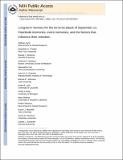Long-Term Memory for the Terrorist Attack of September 11: Flashbulb Memories, Event Memories, and the Factors That Influence Their Retention
Author(s)
Hirst, William; Phelps, Elizabeth A.; Buckner, Randy L.; Budson, Andrew E.; Cuc, Alexandru; Johnson, Marcia K.; Lyle, Keith B.; Lustig, Cindy; Mather, Mara; Meksin, Robert; Mitchell, Karen J.; Ochsner, Kevin N.; Schacter, Daniel L.; Gabrieli, John D. E.; ... Show more Show less
DownloadGabrieli-Long-term memory for the terrorist.pdf (426.9Kb)
OPEN_ACCESS_POLICY
Open Access Policy
Creative Commons Attribution-Noncommercial-Share Alike
Terms of use
Metadata
Show full item recordAbstract
More than 3,000 individuals from 7 U.S. cities reported on their memories of learning of the terrorist attacks of September 11, as well as details about the attack, 1 week, 11 months, and/or 35 months after the assault. Some studies of flashbulb memories examining long-term retention show slowing in the rate of forgetting after a year, whereas others demonstrate accelerated forgetting. This article indicates that (a) the rate of forgetting for flashbulb memories and event memory (memory for details about the event itself) slows after a year, (b) the strong emotional reactions elicited by flashbulb events are remembered poorly, worse than nonemotional features such as where and from whom one learned of the attack, and (c) the content of flashbulb and event memories stabilizes after a year. The results are discussed in terms of community memory practices.
Date issued
2010-08Department
Massachusetts Institute of Technology. Department of Brain and Cognitive SciencesJournal
Journal of Experimental Psychology General
Publisher
American Psychological Association (APA)
Citation
Hirst, William et al. “Long-term Memory for the Terrorist Attack of September 11: Flashbulb Memories, Event Memories, and the Factors That Influence Their Retention.” Journal of Experimental Psychology: General 138.2 (2009): 161–176. Web. 30 Mar. 2012.
Version: Author's final manuscript
ISSN
0096-3445
1939-2222